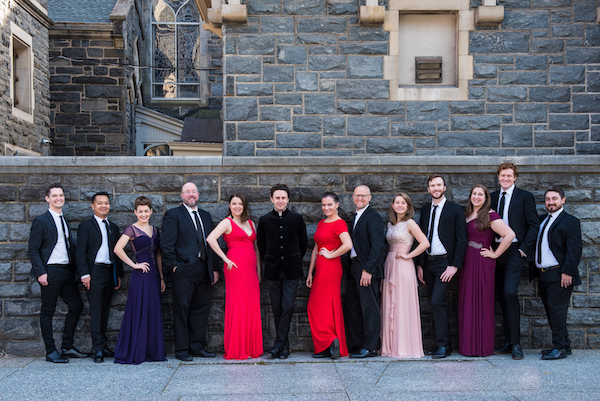A serendipitous streaming tribute to women’s suffrage from The Thirteen

Classical music ensembles are scrambling to salvage a season upended by the coronavirus pandemic. The Thirteen, a chamber choir based in suburban Maryland, scaled back its first concert to an entirely digital affair. A quintet of singers performed the core of the program Friday night at St. Thomas Episcopal Church in Dupont Circle, which was livestreamed to viewers online. A handful of invited guests, including this reviewer, were seated in the choir loft during the performance.
As with so many musical organizations, the chorus and its conductor, Matthew Robertson, had announced a complete season for this fall. As health restrictions remained in force into September, they quickly adapted their plans to this limited, mostly virtual format. Two remote recordings of solo songs were added to the streamed presentation, which can be viewed through September 25. If health conditions improve, the group may eventually allow small audiences to hear its concerts live.
This varied and innovative program consisted almost exclusively of music composed by women, honoring the centenary of the ratification of the 19th Amendment this past August. Even singing through masks, the quintet produced consummate balance and intonation in a few choral pieces, often without Robertson having to conduct them.
These choral works ranged from old to new, beginning with a polyphonic madrigal, Hor che la vaga Aurora by Vittoria Aleotti. Likely the same composer as the nun known as Raffaella Aleotti, hers is a distinctive voice from the late Renaissance and one too long ignored. The complex, often imitative writing in this piece captured the ecstasy of its Italian words, an ode to the music of divine Apollo.
Much more recent choral works followed. Caroline Shaw’s Dolce cantavi, set to a 16th-century text, paired nicely with the Aleotti piece. The three women of the quintet veered precisely through surprising harmonic shifts in a style that at times echoed the work of Gesualdo. With some unusual vocal techniques, including a kind of rippling effect, the piece ended on a clarion, high-set major triad.
More austere was Heyr þú oss himnum á, the setting of an ancient Icelandic prayer by Anna Thorvaldsdottir. Centered on hollow harmonies made of fifths and octaves, the piece oscillated back and forth between dissonant colorings and open sonorities. This work’s more folkloric sound led nicely into the final set of the evening, including Alice Parker’s extravagant version of the Appalachian tune “Come and Taste” and Amy Broadbent’s colorful arrangement of Stephen Foster’s parlor song “Hard Times, Come Again No More.”
Much of the evening was devoted to equally interesting art songs, allowing the listener to sample each of the quintet’s voices individually. Sylvia Leith’s plangent mezzo-soprano helped create the mysterious aura of Ruth Crawford Seeger’s atmospheric “White Moon,” moving calmly through the barbed accompaniment from Robertson at the piano. Baritone Gilbert Spencer displayed a subtly crooning top range in Florence Price’s harmonically rich “Night.”
Leith and Spencer collaborated in the program’s world premiere performance, Strings for Elijah (after Cornelius Eady) by Jenny Olivia Johnson. Their affecting, wordless harmonies sighed alongside a prerecorded track of synthesized strings, punctuated by spoken words relating to the death of Elijah McClain, a musician killed by police officers in Colorado last year. The two singers shifted into affirming words (“You are very strong, you are phenomenal”) as the meditative piece fragmented and came to its conclusion.
Soprano Julie Bosworth had her best solo turn in the chant “O frondens virga” by Hildegard of Bingen, soaring ornately over a drone intoned by the other four singers. More Hildegard featured in the better of the two prerecorded contributions. In “O vivens fons,” from the medieval abbess’s play Ordo Virtutum, mezzo-soprano Caroline Olsen plied her satiny voice to the ecstatic melodic writing, creating her own drone effect with a ukulele.
Tenor Oliver Mercer combined honeyed sweetness and heroic fortitude in “En sourdine,” a harmonically enticing song by Régine Wieniawski, who composed under the pseudonym Poldowski. Soprano Katelyn Aungst delivered a mellifluous legato line and poised, ringing high notes in two songs from What Only Poetry Can Do by the young California-based composer Dale Trumbore.
The final selection, Kate Rusby’s “Underneath the Stars,” became an impromptu memorial to Ruth Bader Ginsburg. When Robertson made a surprise announcement that the beloved Supreme Court Justice had died it clearly overwhelmed some of the performers, who steeled themselves and sang with admirable fortitude. The sweet tune’s pulsed repetitions of “Go gently” infused the end of this excellent concert with a tender melancholy.


